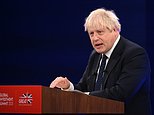Boris Johnson hints at tax cuts before next general election
Boris Johnson heaps pressure on Rishi Sunak ahead of autumn Budget as the Prime Minister hints there WILL be tax cuts before the next general election
Boris Johnson has hinted there will be tax cuts before the next general electionPrime Minister said that he and Rishi Sunak are ‘staunch, low-tax conservative’Comments came as Chancellor prepares for his autumn Budget on October 27
<!–
<!–
<!–<!–
<!–
(function (src, d, tag){
var s = d.createElement(tag), prev = d.getElementsByTagName(tag)[0];
s.src = src;
prev.parentNode.insertBefore(s, prev);
}(“https://www.dailymail.co.uk/static/gunther/1.17.0/async_bundle–.js”, document, “script”));
<!–
DM.loadCSS(“https://www.dailymail.co.uk/static/gunther/gunther-2159/video_bundle–.css”);
<!–
Boris Johnson has suggested there will be tax cuts before the next general election as he piled the pressure on Rishi Sunak ahead of the autumn Budget later this month.
The Prime Minister was pushed on if he will ever reverse recent tax hikes and he said ‘you can take it that Rishi Sunak is, as indeed am I, is a staunch, low-tax conservative’.
The comments are likely to be viewed as a signal that the Government will move to ease the tax burden before the nation next goes to the polls, currently scheduled for 2024.
Boris Johnson has suggested there will be tax cuts before the next general election as he piled the pressure on Rishi Sunak ahead of the autumn Budget
The Prime Minister was pushed on if he will ever reverse recent tax hikes and he said ‘you can take it that Rishi Sunak is, as indeed am I, is a staunch low-tax conservative’
A looming National Insurance rise for millions of workers in April to fund a £12billion boost for health and social care will take the tax burden to record peacetime levels.
The Government has already committed to increase corporation tax from the current rate of 19 per cent to 25 per cent in April 2023.
Tory MPs are pushing the PM and the Chancellor to ease the burden on businesses and families amid fears the tax rises could lead to a hammering at the ballot box.
Mr Johnson was told during an interview with Bloomberg that he ‘used to be an economic liberal’ as he was accused of introducing more red tape rather than cutting it.
The PM defended the tax rises as he said ‘we’ve been through a colossal pandemic which has necessitated the – sadly necessitated – the expansion of state activity into all sorts of fields that neither you nor I would have wanted’.
Asked if he will ever reduce taxes, Mr Johnson replied: ‘You can certainly – I don’t want to anticipate any decisions that the Chancellor may make on the fiscal side – but you can take it that Rishi Sunak is, as indeed am I, is a staunch, low-tax conservative and that is he believes in an enterprise economy and that’s why we are doing all the things that we are doing.
‘And one of the things that we are doing to make this country more attractive to invest in, is Rishi brought in a big – you talk about tax – a huge super-deduction for companies to invest in capital and plant and write that off against tax in order to deal with that productivity issue that we face.
‘The U.K.’s an incredibly successful economy, given that we basically don’t exploit the potential of so much of it — that’s what the whole levelling-up agenda is all about.’
Mr Sunak will deliver his autumn Budget on October 27, with the Chancellor widely expected to rein in public spending.
Government borrowing surged to record levels in 2020 as ministers scrambled to prop up the UK economy during the pandemic
The UK’s national debt has soared to levels last seen in the early 1960s as a result of the coronavirus crisis
Government borrowing soared to record levels during the coronavirus pandemic as ministers spent £407billion on Covid support and the national debt climbed above £2trillion.
Reports last month suggested that Mr Sunak will use the Budget to announce new fiscal rules which will stop the Government borrowing money to pay for day-to-day spending within the next three years.
The Chancellor is also said to want to see the national debt begin to fall by the middle of the decade.
![]()


